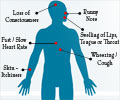A new study in UK finds that the rates of eczema and hay fever have stabilised, but rates of allergic reactions on the rise.
A new study shows that the prevalence of hay fever and eczema in the U.K has steadied considerably, while severe allergic reactions have risen sharply.
In the research that has been published today published in the journal Thorax, the scientists at the University of Edinburgh have said that the rates of eczema and hay fever in UK have stabilised, after many years of steady rise but at the same time allergic reactions to food have increased. Mentioning that although rates of eczema and hay fever in children had increased more than three times in the past three decades, they stated that the hospital admissions and visits to doctors for both conditions have reduced since 1995.Professor Aziz Sheikh, who headed the research team, said, 'Taken together, these patterns of prevalence, prescribing and healthcare use suggest a rise in eczema and hay fever in recent decades with a stabilisation more recently.' He further added that that the treatments had improved remarkably over the years and that might have contributed to the decline in eczema and hay fever.
The researchers had explained that the team had carried out a time trends analysis on the rates of illness and death for most of the allergic disorders, except asthma. They explained to have used the national representative data and information from national surveys, consultations with primary care health practitioners, prescriptions, hospital admissions, and deaths.
They explained to have found that hospital admissions for anaphylaxis or serious allergic reactions had risen by 700% and food allergies by 500% since 1990. They also found that the prescriptions for these allergies have also increased since 1991. Their findings reported that there were around 3,000 admissions to the hospital in 2004, for anaphylaxis, as compared to 415 cases in 1991-92.
Records have shown that there were 12 deaths from anaphylaxis from 1991 to 1995 but the researchers were of the opinion that it was likely to be underestimated as certain deaths that could have occurred from allergic reactions might have been recorded as due to asthma.
Professor Sheikh said, 'They are very dramatic increases.' And the researchers have called for further studies and said ongoing surveillance will help healthcare systems anticipate and deal with allergies.
Advertisement
Source-Medindia
VIK











